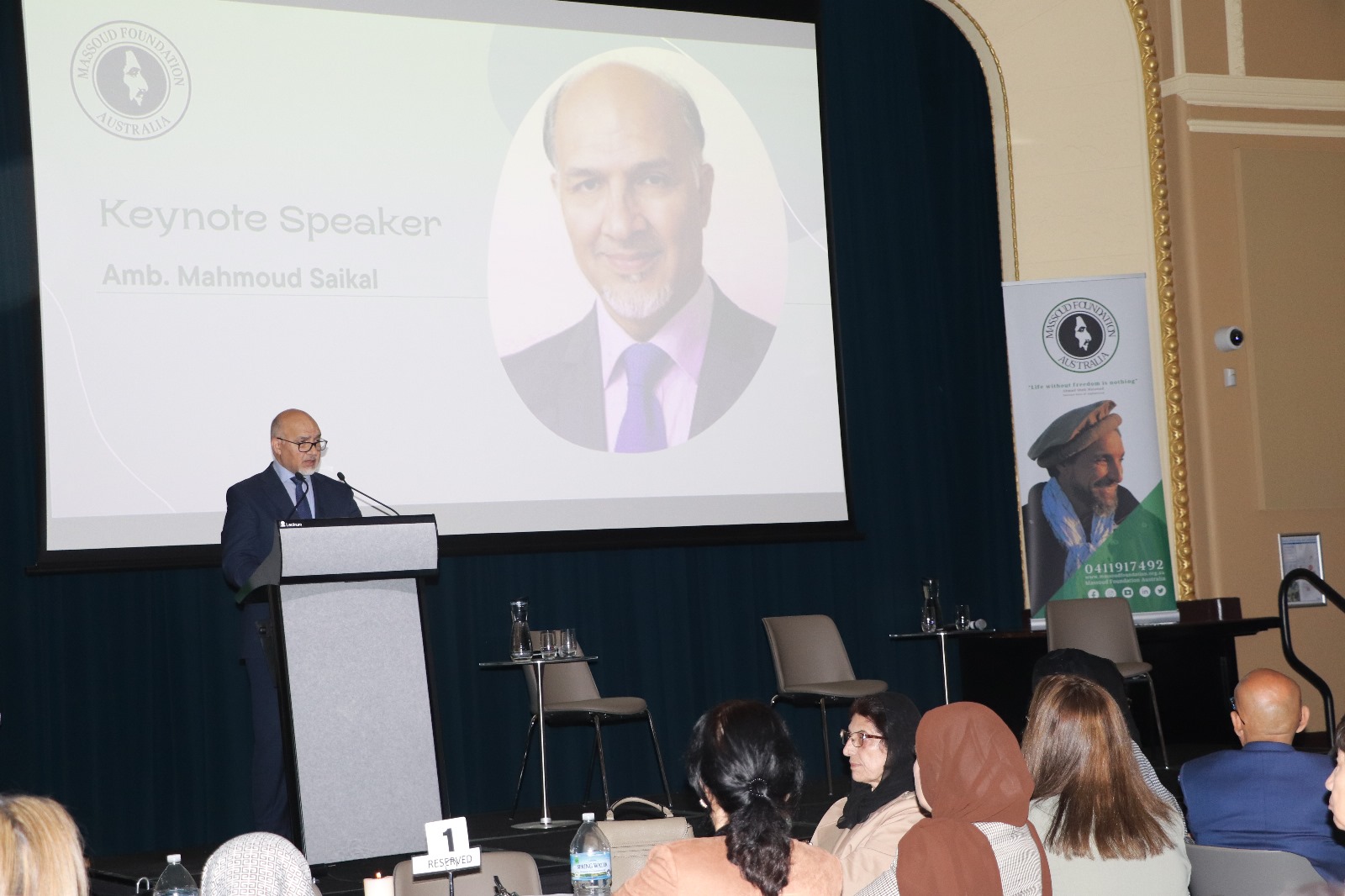My remarks on the 23rd anniversary of the assassination of Commander Ahmad Shah Massoud at the commemorative event in Sydney, Australia, 20 September 2024
In the Name of God, the beneficent, the merciful
Excellencies, distinguished guests, elders of the community, friends and colleagues, ladies, and gentlemen,
At the outset, let me thank Massoud Foundation Australia and Mr Bilal Waheed and his entire team for organizing this august event on the 23rd anniversary of Commander Ahmad Shah Massoud’s tragic assassination by two international terrorists.
The suicide attack of that kind on the life of a prominent leader, had never happened in Afghanistan before, but it was the beginning of many suicide attacks by the Taliban to come.
Among them, the assassination of Professor Burhanuddin Rabbani, former president of Afghanistan and the head of the High Peace Council, which happened 13 years ago, exactly today in Kabul (I was 1km away from it). Prof Rabbani was the religious and political mentor of Commander Massoud. They both had a reputation for being moderate in their approaches, wanting an Afghanistan in peace with itself and in peace with its neighbours and the world at large.
Let us pay tribute to Commander Massoud, the National Hero of Afghanistan, Professor Rabbani, and numerous others from all over Afghanistan, who lost their lives in defence of our country’s freedom, peace, security, justice, and development, which in turn kept the peace and security of our region and the world at large. May they rest in peace and may God Almighty bless their souls.
Using this opportunity, I would like to acknowledge the 41 soldiers of Australian Defence Force, who paid the ultimate price in Afghanistan for our safety and international peace and security.
Commander Massoud, a genius strategist, had the habit of getting to the point quickly (jan-i-gap). So, this evening I try to get right to the point.
The calamity that Afghanistan has been going through since the return of the Taliban, stands unique in the history of the country and possibly in certain aspects, in the history of the planet earth. The world has never experienced a gender apartheid of the magnitude and severity that the Taliban have imposed in our country. Terrorism has never had a geography as big as Afghanistan (a lot bigger than France) at its disposal for this length of time. No country in the world has been without a government with over three years; I mean a government recognized by its people and by the international community.
I tried to describe the Taliban policies in one word. The word that came to my mind was “despicable,” which was used by the late US Secretary of State Madeline Albright in 1997 to denounce the Taliban policies toward women.
Four key questions are:
Why has this happened? What went wrong?
What is the status quo?
What do we do to bring positive change?
And if we do succeed, what is our vision for future Afghanistan?
On What went wrong; reviews of the 20 years of the republic, identification of the problems and acknowledgment of mistakes are crucial. We can only move ahead confidently if we know what has gone wrong in the past and how best we can avoid repeating it.
Various countries with significant engagements in Afghanistan have already conducted their reviews at government, parliament, and/or other levels; some of our neighbours and regional countries, the United States, European countries…
I am glad that days after the takeover of Kabul by the Taliban, the Australian Senate launched an inquiry on Australia’s engagement in Afghanistan. I had the pleasure of making a submission to the inquiry and made a presentation at the relevant hearing. By early 2022, the report of that inquiry, made a number of good recommendations on improving the humanitarian and economic situation in Afghanistan, assisting the flow of our refugees to Australia as well as Veterans’ support and wellbeing.
More important than that was Australia’s Brereton Report which was commissioned in 2016 to undertake an inquiry into events in Afghanistan, with over 60,000 pages of evidence. Its findings on the unfortunate and unlawful killing of a number of our nationals in the hand of certain members of the Australian Defence Force; the apology of Australian Chief of Defense Force to the peoples of Afghanistan and Australia; and the implementation of almost all the 143 recommendations of the report must bring some comfort to both of our nations. Mistakes have been highly regrettable, but Australia’s courage in openly addressing them is worthy of praise.
What is important is a review of us, the people of Afghanistan, of the events in our country, to find out what exactly went wrong, why? and by who and when? Who was honest and who was corrupt? This was my request after I resigned from government positions twice, and once from a state corporate position, but the review never happened. Hence, honesty and integrity have remained captives of the murky and muddy past. Unless and until we undertake an independent review, our current efforts to liberate Afghanistan from the Taliban tyranny will continue to face problems.
What is the status quo? What Commander Massoud warned the world about 24 years ago, has now reemerged in a wider scale – under the Taliban, Afghanistan has turned into a real breeding ground of terror, with tens of thousands of foreign terrorist fighters, belonging to over 20 regional and international terror outfits, including Al-Qaida, Daeish, TTP…. all positioned in different parts of our country, particularly in the north.
Rapid radicalization of our children, boys, and girls, and that of foreign terrorist fighters, is underway through a network of tens of thousands of so-called “jihadi madrassas,” run by the Taliban throughout the country. For the latest on this pls have a look at the UN SG report on the situation in Afghanistan.
The region is already receiving the terror blows emanating from Afghanistan; Pakistan the inventor of the Taliban, itself experiences almost daily TTP terror attacks rooted in Afghanistan; Iran, Tajikistan and Russian Federation have also experienced major terrorist attacks with roots in Afg. Several other terror attacks and arrests in Europe & US are either directly linked to Afghanistan or inspired by the so-called Taliban victory. Certain attacks in Australia, thankfully minor and not major, especially here in Sydney, are inspired if not linked by the culture of violence promoted by the Taliban.
Don’t forget, before there were any such things as ISIS, Al-Qaida, TTP, ETIM, Boko Haram, al-Shabab etc…there was the Taliban, a key factor behind the current wave of radicalization, extremism, and terrorism.
When it comes to the gross violation of human rights; it is enough to say that our entire population, over 40 million, live under a totalitarian regime, imposing restrictions in most aspects of life. In particular, women and girls, half of our population, face gender apartheid. Just two days ago, the head of UNWomen in her presentation to the Security Council said that according to their survey 90% of women report that their mental health is very bad and getting worse. The so-called Vice and Virtue laws are in effect the Taliban instruments of subjugating the entire population and erasing women and girls from the public life.
According to a recent IOM report, nearly 8 million have left Afghanistan in the past four years. That is nearly one fourth of our population. Millions more are struggling to leave the country. The tens of thousands of applications lodged with Australia’s department of Home Affairs is a small indication of the magnitude of the problem.
The humanitarian situation is getting worse. Nearly 24 million people require humanitarian assistance. That is 60% of our population.
What do we do and what are the challenges?
Despite the fatigue of lengthy years of conflict and brutal suppression of the Taliban, the people of Afghanistan have expressed their opposition to the Taliban rule from day one.
Opposition groups with physical presence on the ground and familiar with the Taliban behaviour for three decades, work with a two-fold strategy: one short-term: which is a struggle for freedom, involving pressure of all sorts on the Taliban to either bring them to the genuine negotiating table or drive them to their downfall; and one medium term, involving political negotiations among the key stakeholders and a transition to normalcy. Throughout the strategy, avoiding the deterioration of the humanitarian, economic and human rights situations is a top priority.
The short-term strategy requires:
• internal strengthening and improved coordination of the opposition groups. You have seen different gatherings (in person) of the opposition groups in the recent time in Vienna and Tirana of Albania, and continuous hybrid conferences.
• Armed resistance is another key part of the short-term strategy. The report of the UN Secretary-General released last week, verifies 92 resistance attacks on Taliban posts and vehicles in two and half months, using hit and run tactics and carrying out ambushes of different kinds. This is a rapid surge in the resistance operations compared to the 43 attacks in three and half months, verified in the previous UN report issued three months ago.
• Regional and global coordination is needed to increase conditionality and pressure on the Taliban. So far, no country has given official recognition to the so-called Taliban care-taker government. We have also seen numerous and continuous messages of condemnation of the Taliban violation of human rights by countries and international organizations, and strong calls for the reversal of the draconian decrees. Beyond that, the world is divided; and a durable solution to the crisis of Afghanistan has fallen victim to the heated geopolitical games due to the Ukraine and Gaza wars, the tensions in the Indo-Pacific region and other contentious hotspots. Mainly for this reason, almost all major actors are after engagement with the Taliban; on the surface in the name of bringing positive change in them, in reality trying to outmanoeuvre their adversaries in using the Taliban against them. Lately, they have been pushing the engagement through a UN mechanism based on an independent assessment, which was undertaken by the UN in 2023. This has created oxygen and lavishing opportunities for the Taliban and other terror outfits positioned in Afghanistan. I call it the geo-politicization of terrorism and human rights, causing counter-terrorism and the fight for human rights to fall into pieces. Desperate efforts are needed to unify the world in these fights.
• On the face of it, the fact is that after the passage of over three years, the international community’s heavy engagement with the Taliban in the hope of holding them to account for their actions, commitments, and applicable international obligations, have backfired. The Taliban have been emboldened and continue to cause obstacles to safe passage of those seeking to depart Afghanistan, they allow international terrorist groups to use our soil and present them logistic support, they hinder the delivery of humanitarian assistance with complete disrespect to international principles, and their human rights violation is getting worse, particularly when it comes to the rights of women and girls. It is time that we review the entire concept of engaging with the Taliban and this time, also, hold the diehard “engagementalists” to account.
Taken together, this short-term strategy needs to continue until we reach a level of strategic stalemate, which would either bring the Taliban to genuinely negotiate or face downfall. Either way, this in turn will bring us to the second phase of the strategy, which is political negotiations, involving a national dialogue among all political, civil, and military groups (including reconcilable Taliban) and a transition period with its own details, leading us to a legal, democratic, and peaceful Afghanistan. We don’t have enough time tonight to explain the details of that phase. We probably need another conference for that.
Thank you


